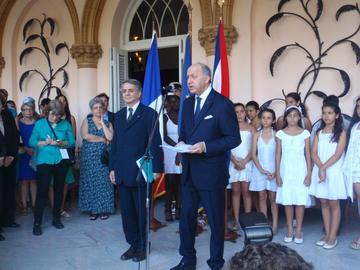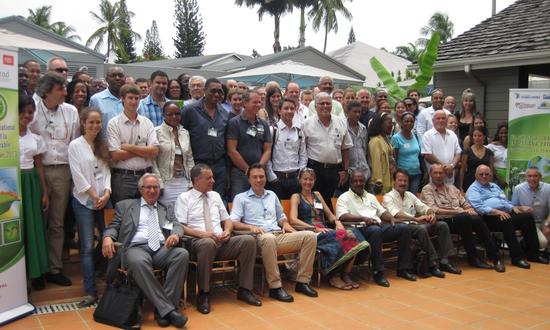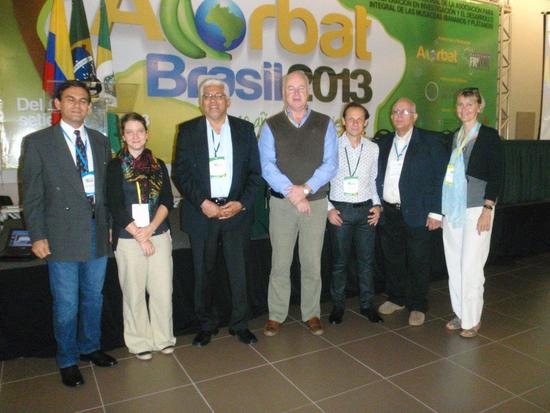Conference and seminars
Seminar on Fusarium musa and development of diagnosis methods, May 2014, Trinidad and Tobago.
From April 28 to May 8 2014, a regional seminar organized by FAO and CARDI on the prevention and diagnosis of race 4 tropical on bananas and plantains was held in Port of Spain in Trinidad and Tobago.
Luis Perez Vicente (INISAV), Fusarium specialist and Cabaré project coordinator in Cuba was one of three seminar trainers. He presented the epidemiological situation of race 4 type Tropical Fusarium as well as its program of prevention. In the Caribbean it is not currently present, but to anticipate the possible contamination of Caribbean soil, this seminar was followed, from May 5 to 8, by training in diagnosing this disease. Yolande Chilin-Charles (CIRAD Guadeloupe), involved in the Cabaré project, completed the training. A dozen people from six Caribbean countries benefited from this training course. This will allow greater responsiveness in the event of contamination of the Caribbean to avoid uncontrolled spread of the disease, as was the case for black Sigatoka.
The presence of Cabaré researchers at this seminar was very important for the continuation of the project. Indeed, one ambition is to continue on a new project to fight against emerging banana diseases including Fusarium, involving a network of sectors in the fight against the expansion of multiple banana diseases.
INISAV International Plant Health Seminar, April 2014, Cuba.
The INISAV organized its 7th International Seminar on Plant Health in collaboration with the National Center for Plant Health (CNSV), from 7 to 11 April 2014. This event brought together 120 people from twenty countries.
This seminar addressed the specific issue of agricultural systems sustainability. Scientific and technial approaches were used to encourage exchange of ideas between researchers, specialists, teachers, students, farmers and entrepreneurs in the field of plant health. The seminar organized round tables, workshops and conferences.
Catherine Abadie presented a summary of scientific and technical work carried out under the Cabaré project. Observations in Cuba and the Dominican Republic on resistant hybrids have helped improve understanding of environmental (climatic, agronomic, soil) factors on the severity of black Sigatoka on banana hybrids. Initial results show in that the Dominican Republic, the decrease in the level of resistance of the FHIA21 hybrid may be explained by rainfall, cropping practices (plant density, irrigation, weed control) and edaphic factors (levels of magnesium, phosphorus or nitrogen in the soil).
Javas E. Higginson (INISAV) presented the risk of spread of BSV to Cuba linked to its molecular diversity.
Luis Perez Vicente (INISAV) also presented his findings on the potential impact of climate change on the spread of black Sigatoka in banana and plantain in Cuba.
The seminar was attended by Laurent Fabius, French Minister of Foreign Affairs and International Development.
11th INIVIT Symposium.
C. Abadie participated in the 2nd International Symposium on roots, rhizome, tubers, plantain,
banana and papaya organized by INIVIT and held from 22 to 25 October at Cayo Santa Maria (Villa Clara province). She presented a paper on the history of banana black Sigatoka invasions worldwide and in the West Indies. This symposium provided an opportunity to promote the project and boost awareness on some project findings. On this occasion, L. Perez (INISAV) gave a talk on the results of the epidemiological surveys conducted by A. Cavalier in 2011 and 2012 within the framework of the project. Two posters were also presented by L. Morales (INIVIT) to outline the Cabaré project and by E. Javer (INISAV) to present BSV prevalence results obtained under the project.
14th Plant Virology Meeting at Aussois (France)
From 13 to 17 January 2013, Pierre-Yves Teycheney and Reina Teresa Martinez participated in the 14th Plant Virology Meeting held at Aussois (France). R.T. Martinez (IDIAF) presented the findings of research she is carrying out within the framework of the project and of her PhD thesis. Her initial results showed that several banana streak virus (BSV) species occur in the Dominican Republic on Macho x Hembra and FHIA21 banana varieties—the focus of her thesis. They also revealed that BSOLV virus species prevalence levels were significantly higher on the FHIA21 banana variety than on the MxH variety at all sampled sites, suggesting that the OL1 infection allele is more highly expressed in FHIA21 than in MxH. These studies have meanwhile been supplemented and the results confirmed through an analysis of a high number of samples.
First scientific workshop on black Sigatoka control and banana production held in Havana (Cuba)
The first scientific workshop on controlling black Sigatoka of banana crops in the Caribbean region was held in Havana (Cuba) from 18 to 21 March 2013. There were some 50 participants: CIRAD, UGPBAN, IT2, IDIAF, INIVIT, INISAV and IBP partners involved in the INTERREG Cabaré and Banane durable Caraïbes (BDC) projects; institutional partners from the French Embassy in Cuba, producers’ groups and organizations from Guadeloupe, Martinique, Dominica, St. Lucia, Costa Rica and the Dominican Republic; and radio and newspaper journalists.
The aim of this seminar was to review recent advances in black Sigatoka research in order to lay the groundwork for a regional targeted research partnership geared towards promoting sustainable black Sigatoka control initiatives throughout the Caribbean region.
This workshop highlighted the need for further research on the epidemiology of the disease and for the breeding and selection of resistant dessert and cooking banana varieties. Concerning the latter aspect, GMOs are being studied by Cuban research institutes, whereas other partner institutes are focusing on banana breeding. Moreover, initiatives under way to develop sustainable cropping systems should be pursued so as to come up with alternatives to chemical control, including biological control and biopesticides.
One key point of this workshop is an initiative to create a regional banana research and experimentation platform, which was jointly supported by all partners. The workshop also had substantial media coverage and boosted awareness on the project.
Second scientific workshop on black Sigatoka control and sustainable banana production in the Caribbean held at Gosier (Guadeloupe)
The first workshop on black Sigatoka was a first step towards sharing research results on this banana disease. To advance in this direction, CIRAD, IT2 and UGPBAN organized a second workshop that was held from 25 to 27 June 2013 at the Créole Beach Hotel in Guadeloupe. This workshop, supported by the Banana World Forum and the INTERREG IV Caribbean programme, was attended by about 100 participants from 10 countries and involving Plan Banane Durable, Banane Durable Caraïbes and Cabaré project partners.
There were five thematic roundtables: gaining insight into thepathogen, optimizing control methods, black Sigatoka disease treatments, genetic strategies, and a last one devoted to innovative low-input cropping systems. This workshop provided an opportunity to review efficient cultivation techniques for controlling this banana disease and brought together the four banana genetic improvement programmes based in the Caribbean region (INIVIT-Cuba, FHIA-Honduras, EMBRAPA-Brazil, CIRAD-French West Indies). It also highlighted the need to promote sustainable cropping systems based on integrated pest management strategies to curb the use of chemical inputs, while meeting societal, ecological, economic and toxicological requirements. From this standpoint, studies on service plants, which help to control pests and weeds and limit the need for pesticide treatments, are of major interest. In Guadeloupe and Martinique, CIRAD is developing innovative low-input cropping systems based on service plants, which the workshop participants discovered during field visits at the end of the workshop. Participants were also taken to hybrid banana selection plots set up by CIRAD where they were introduced to the CIRAD Musa Germplasm Collection hosted at the Tropical Plant Biological Resource Centre in Guadeloupe.
20th ACORBAT International Meeting
The 20th ACORBAT International Meeting was held from 7 to 14 September 2013 at Fortaleza (Brazil). The project provided funding support for four participants who presented Cabaré and the project results: Catherine Abadie (CIRAD), Aurore Cavalier (CIRAD), Elisa Javer Higginson (INISAV) and Pierre-Yves Teycheney (CIRAD). Other project participants were also present: J. Clase Salas and L. Minier (Dominican Republic), L. Perez Vicente (Cuba) and T. Lescot (France).
C. Abadie and A. Cavalier presented their work on black Sigatoka. C. Abadie, who presented her research on black Sigatoka invasion routes worldwide and in the West Indies, was awarded a prize for the best paper of the meeting. A. Cavalier presented her research on the impact of environmental factors on the severity of black Sigatoka noted on initially resistant hybrid banana varieties. This paper is the result of a survey carried out during the 2 years of her civic service and voluntary work contract under the Cabaré project. E. Javer-Higginson presented research carried out in Cuba and the Dominican Republic under the project on the prevalence and diversity of BSV species. Finally, P-Y. Teycheney presented the Cabaré project, activities, partnerships and expected results.
Participants at the meeting visited an intensive commercial plantation on which the Prata Ana variety is grown.
The meeting also provided an opportunity for the project partners to hold two black Sigatoka research coordination meetings in the presence of L. Minier, J. Classe Salas, L. Perez Vicente and T. Lescot.
Cabaré at the annual meeting of the Caribbean Food Crops Society
Catherine Abadie presented the Cabaréproject at the last annualmeeting of the CaribbeanFood Crops Society(CFCS) which was held in Barbados in July 2011. A poster presenting the objectives and partners of the project was on display for the duration of the meeting.



